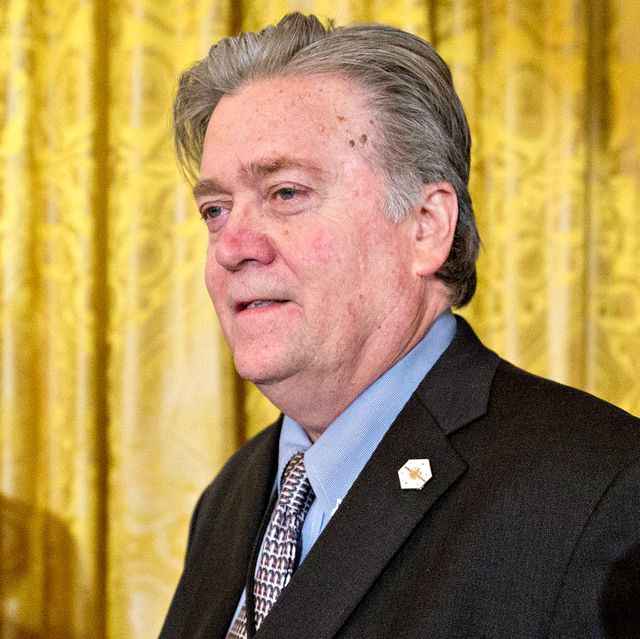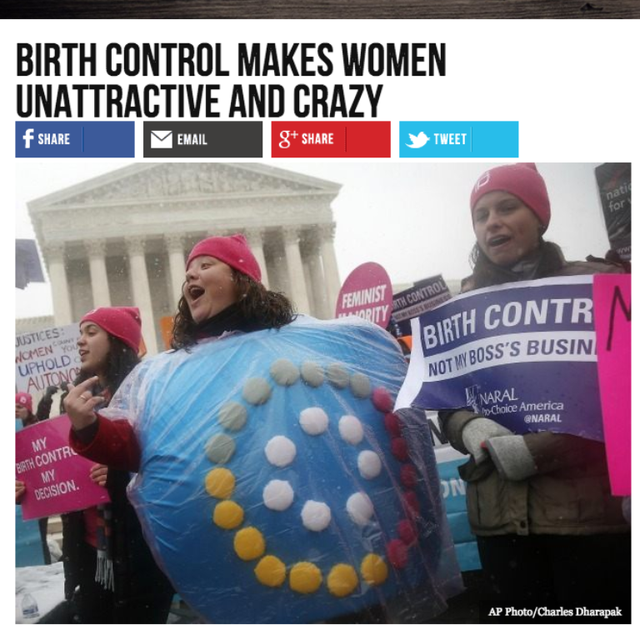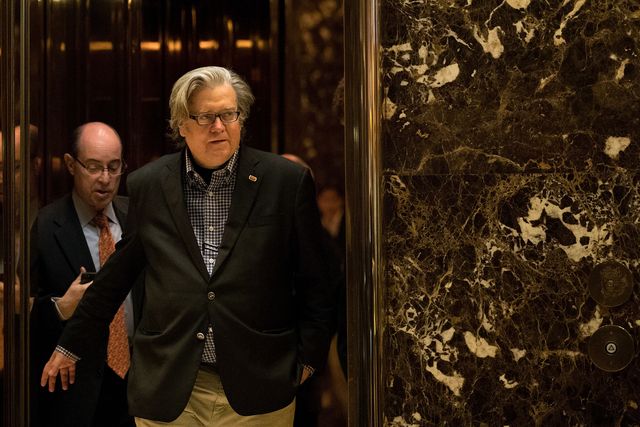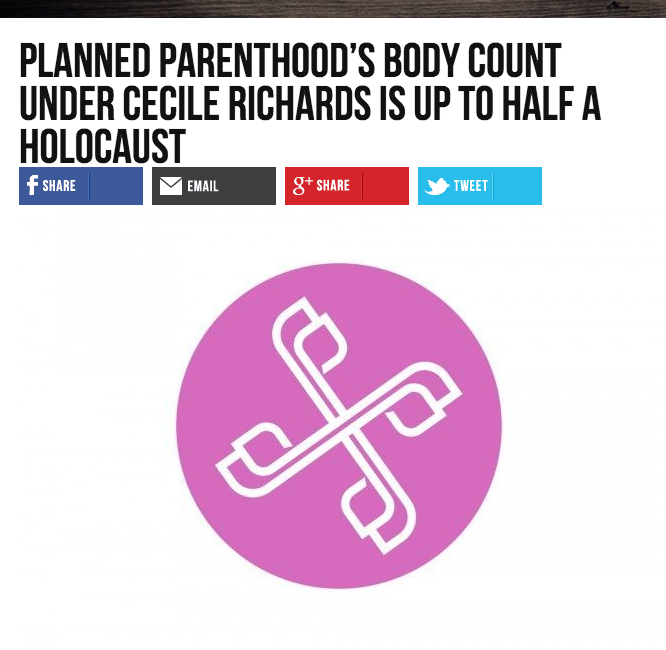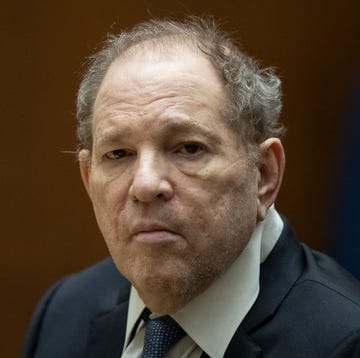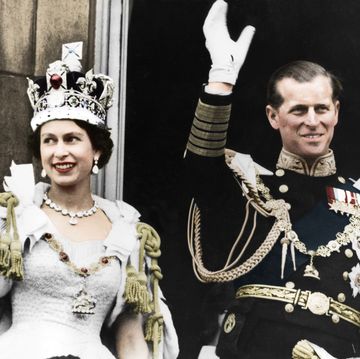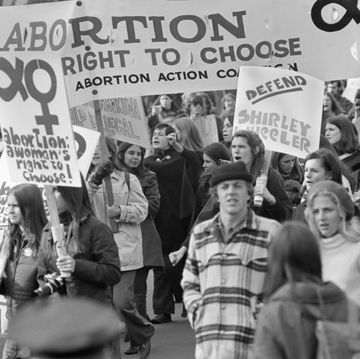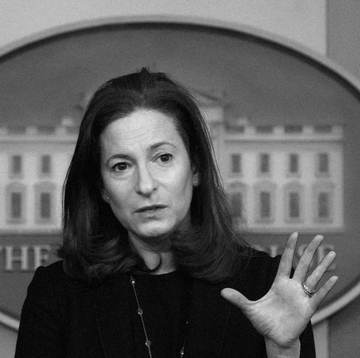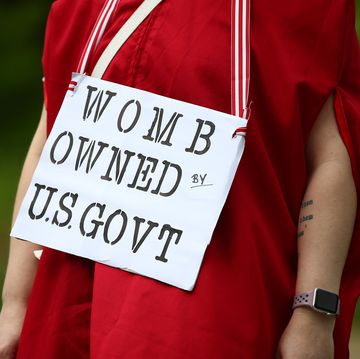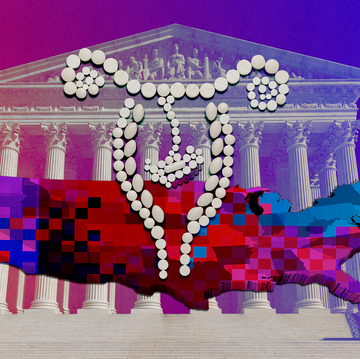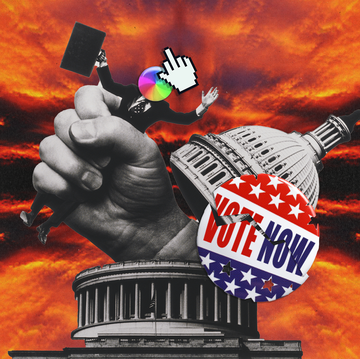Donald Trump named some very important White House positions over his first weekend as president-elect. His selection of one of his campaign managers, Stephen K. Bannon, to chief strategist and senior adviser immediately stirred controversy.
Like Trump, Bannon is a Washington outsider who has never been elected to office, and he is most known for running a controversial website. But since his dramatic exit from the White House, he hasn't held back against his former boss. Here's what you need to know about Bannon:
1. Bannon was the executive chairman of Breitbart News, a website for the "alt-right."
Breitbart News is a divisive right-wing opinion and news outlet, known for offensive headlines like “Bill Kristol: Republican Spoiler, Renegade Jew,” “Trannies 49 Xs Higher HIV Rate,” and “Birth Control Makes Women Unattractive and Crazy.” According to the Southern Poverty Law Center, the site promotes racist, anti-Muslim, and anti-immigrant ideas, and it has been accused of white nationalism, a movement that opposes multiculturalism and believes in the supremacy of the white race. Bannon, who took a leave from Breitbart while working for Trump, described his ideology to Mother Jones as "nationalist," but not necessarily white nationalist. Former Ku Klux Klan leader David Duke called Bannon's selection as chief strategist "excellent," and Peter Brimelow, who runs the white nationalist site VDARE, called it "amazing."
Bannon, who was with the site for about a decade and ran the business out of the basement of his D.C. townhouse, according to a Bloomberg profile, told Mother Jones about the site, "We're the platform for the alt-right." According to NPR, "The views of the alt-right are widely seen as anti-Semitic and white supremacist."
The site was hugely successful during the 2016 presidential campaign, thanks to social media. On Election Night, Breitbart's Facebook page had the fourth-highest number of user interactions on the whole platform, beating CNN, Fox News, and the New York Times, according to the New York Times.
After leaving the White House in 2017, Bannon returned to the site as executive chairman in August, Politico reported. But in January 2018, owners of the site, Republican megadonors Robert and Rebekah Mercer, publicly distanced themselves from Bannon following inflammatory statements he made about the Trump family in Michael Wolff's book Fire and Fury. And shortly after, Bannon stepped down from his position at the site. In a statement posted on Breitbart Bannon said: "I'm proud of what the Breitbart team has accomplished in so short a period of time in building out a world-class news platform.”
2. He started a nonprofit to investigate politicians.
Bannon is the co-founder of the Government Accountability Institute, or GAI, a nonprofit that investigates politicians and delivers findings to mainstream media outlets, like Newsweek and ABC News, according to Bloomberg.
GAI’s president, Peter Schweizer, wrote Clinton Cash as well as the ebook, Bush Bucks. Clinton Cash — which looked at donations made to the Clinton Foundation, a topic of constant attention during Trump’s campaign — was later made into a documentary.
3. He served in the U.S. Navy.
Bannon signed up to serve right after college, spending four years at sea, according to Bloomberg. His daughter Maureen followed in his footsteps, attending West Point and then serving as a lieutenant in the 101st Airborne Division.
4. He grew up in a family of Democrats in Norfolk, Virginia.
And he goes after Republicans, including Speaker of the House Paul Ryan, as well as attacking Democrats, like the Clintons.
“I come from a blue-collar, Irish Catholic, pro-Kennedy, pro-union family of Democrats,” Bannon told Bloomberg. “I wasn’t political until I got into the service and saw how badly Jimmy Carter f---ed things up. I became a huge Reagan admirer.”
When his father, Marty Bannon, lost $100,000 selling off the long-held AT&T stocks he'd had after decades of working for the company, Bannon's self-described "economic nationalist" stance was solidified.
"The only net worth my father had beside his tiny little house was that AT&T stock. And nobody is held accountable?” Bannon told the Wall Street Journal. “All these firms get bailed out. There’s no equity taken from anybody. There’s no one in jail. These companies are all overleveraged, and everyone looked the other way.”
5. Bannon worked at the investment bank Goldman Sachs.
Though Trump's campaign promised to go after big banks, Bannon worked for one of the biggest.
After leaving the Navy, Bannon earned a master’s degree in national security studies at Georgetown University and then went on to Harvard Business School before landing an investment banking job at Goldman Sachs' New York offices.
“The camaraderie was amazing. It was like being in the Navy, in the wardroom of a ship," he told Bloomberg.
After leaving that bank in 1990, he started Bannon & Co., a boutique investment bank specializing in media. The bank was eventually bought and Bannon is no longer affiliated.
6. He has Hollywood ties.
When he ran his own investment bank, Bannon invested in films, and he eventually made the leap to directing movies, like In the Face of Evil, a celebration of the Ronald Reagan administration, and The Undefeated, a 2011 documentary about failed vice presidential candidate Sarah Palin.
7. He said progressives vilify conservative women because they’re not "a bunch of dykes."
During a 2011 radio interview, Bannon said women like Ann Coulter, Michele Bachmann, and Palin threaten the progressive narrative.
“That’s why there are some unintended consequences of the women’s liberation movement. That, in fact, the women that would lead this country would be pro-family, they would have husbands, they would love their children. They wouldn’t be a bunch of dykes that came from the Seven Sisters schools up in New England,” he said, referring to historic women’s colleges. “That drives the left insane and that’s why they hate these women.”
8. He’s been wanting to shake up the Republican Party for years.
Breitbart News cheered on the Tea Party, a wing of the Republican Party, in its early years and supported the 2013 government shutdown, according to Bloomberg. In fact, in 2010, Bannon said in an interview, “What we need to do is bitch slap the Republican party.”
9. He was charged with domestic abuse.
In 1996, Bannon was charged with misdemeanor domestic violence, battery, and dissuading a witness, though the case was ultimately dismissed, according to a police report and court documents obtained by Politico.
The case was brought by his then-wife, who claimed Bannon pulled at her neck and wrist, then smashed her phone when she tried to call the police. His ex-wife did not appear in court and Bannon pleaded “not guilty,” so the case was dismissed.
10. His ex-wife has accused him of being anti-Semitic.
The same wife who accused Bannon of abuse said in 2007 court documents that he didn’t want their daughters to go to a particular school because of the number of Jewish students enrolled.
"The biggest problem he had with Archer is the number of Jews that attend," she said in her 2007 statement, according to the New York Daily News. "He said that he doesn't like the way they raise their kids to be 'whiny brats' and that he didn't want the girls going to school with Jews."
A spokesperson for Bannon told the Daily News: “At the time, Mr. Bannon never said anything like that.”
11. Bannon's site, Breitbart News, has regularly attacked Planned Parenthood, going so far as to compare their work to the Holocaust.
In an August 2015 article headlined “Planned Parenthood’s Body Count Under Cecile Richards is Up to Half a Holocaust,” the author writes that the women’s health organization, which provides a range of health services including abortions and which Trump has threatened to defund, has “comfortably surpassing Hitler according to its own annual reports. You have to admire the chutzpah, if you’ll forgive my terminology: Planned Parenthood has amassed a Third Reich-style death count completely legally.”
12. Those from the left and the right came out against Bannon holding the role of chief strategist.
A spokesperson for then-Senate Minority Leader Harry Reid said in a statement:
President-elect Trump’s choice of Steve Bannon as his top aide signals that white supremacists will be represented at the highest levels in Trump’s White House. It is easy to see why the KKK views Trump as their champion when Trump appoints one of the foremost peddlers of White Supremacist themes and rhetoric as his top aide. Bannon was ‘the main driver behind Breitbart becoming a white ethno-nationalist propaganda mill,’ according to the Southern Poverty Law Center.
Others spoke out on Twitter:
Meanwhile, Trump supporters continued to defend Bannon.
13. He has lashed out at the media.
On Jan. 26, 2017, Bannon said the media, not the Democratic Party, is the "opposition party." “The media should be embarrassed and humiliated and keep its mouth shut and just listen for awhile,” he told the New York Times, adding, "The media here is the opposition party. They don’t understand this country. They still do not understand why Donald Trump is the president of the United States.” He also said, "The media has zero integrity, zero intelligence, and no hard work.”
14. He was briefly a member of the National Security Council.
In January 2017, in a very unusual decision, Trump reorganized the National Security Council by elevating Bannon and limiting the power of the director of national intelligence and the chairman of the joint chiefs of staff. Bannon sat in on the top interagency group for discussing national security, and experts said this was controversial, to say the least. Nancy Pelosi slammed the decision, saying it would make America less safe: “It’s a stunning thing, that a white supremacist would be a permanent member of the National Security Council,” she said.
Susan Rice, former Obama national security adviser, referred to the decision as “stone cold crazy,” in a tweet:
In response to Bannon's unprecedented control over the White House, the #StopPresidentBannon hashtag exploded on Twitter on Sunday.
On April 5, Bloomberg reported Bannon had been removed from the National Security Council, and the director of national intelligence and the chairman of the joint chiefs of staff would be "regular attendees" at the council's principals committee.
Shortly after news broke that he had been removed from the council, the New York Times reported Bannon wasn't happy about the decision and that "he even [threatened] at one point to quit if it went forward." Bannon's camp denied the claim, saying the decision to remove him was a "natural evolution" and not any kind of sign of lessening influence.
15. He gave a rare public appearance at the Conservative Political Action Conference.
Bannon, who rarely speaks in public, sat on a panel with fellow top White House adviser Reince Priebus at CPAC in February. The pair insisted stories about their relationship being tense are false and Bannon took the opportunity to blame any negative attention on the media, which he referred to multiple times as "the opposition party." He said, "If you look at the opposition party and how they portrayed the campaign, how they portrayed the transition and, now, how they're portraying the administration — it's always wrong."
16. His voter registration was under scrutiny.
According to the Washington Post, Bannon was registered to vote in both New York and Florida last year. He listed his Florida address as a vacant Miami home, according to the report. And under Florida law, it is a third-degree felony to include false information on a voter registration application. When the Post inquired about the Miami-Dade County State Attorney's Office investigation into the residency claim, they cited confidentiality rules for “active criminal investigative information.” Prosecutors said in March that there was not enough evidence to charge him with voter fraud.
17. He left the White House in August.
On August 18, 2017, Bannon officially left his position at the White House, the New York Times reported. His exit came at a time when Trump was under fire for saying there were good people on "both sides" of the violence in Charlottesville, Virginia. “White House Chief of Staff John Kelly and Steve Bannon have mutually agreed today would be Steve’s last day,” press secretary Sarah Huckabee Sanders said in a statement. “We are grateful for his service and wish him the best.”
According to the Times report, people close to Trump had urged him to fire Bannon, and people close to Bannon urged him to leave. “In many ways I think I can be more effective fighting from the outside for the agenda President Trump ran on. And anyone who stands in our way, we will go to war with,” Bannon told the newspaper.
18. He has supported far-right candidates for office.
Since leaving the White House, Bannon has lent his support to candidates in an effort to unseat the GOP establishment, and especially those aligned with Senate Majority Leader Mitch McConnell.
In both the Republican primary and the general election, Bannon publicly backed Alabama Senate candidate Roy Moore, a former chief state justice and accused child molester. But despite Moore's loss to Democrat Doug Jones, Bannon told Newsweek he was "totally uncowed" and vowed to keep fighting for candidates he believed in.
19. He trashed Trump in a new book.
Bannon did not mince words when speaking to author Michael Wolff for his book, Fire and Fury: Inside the Trump White House. According to The Guardian, which obtained an early copy of the book, Bannon called a 2016 meeting between Donald Trump Jr. and a group of Russians "treasonous" and "unpatriotic," adding, “They’re going to crack Don Junior like an egg on national TV.”
The White House fired back with a no-holds-barred statement trashing Bannon. “When he was fired, he not only lost his job, he lost his mind,” Trump said. “Now that he is on his own, Steve is learning that winning isn’t as easy as I make it look. [...] Steve doesn't represent my base - he's only in it for himself."
CNN reports that later that day, Trump's lawyer sent Bannon a cease-and-desist letter, noting a confidentiality and non-disparagement agreement he apparently signed. On Wednesday night, Bannon praised the president on Breitbart radio. "The President of the United States is a great man," he said. "You know, I support him day in and day out." The next morning, he reiterated his support, saying, "nothing will ever come between us and President Trump and his agenda."
In a Jan 6 statement to Axios, Bannon apologized to the president and his family. “Donald Trump, Jr. is both a patriot and a good man. He has been relentless in his advocacy for his father and the agenda that has helped turn our country around."
He followed up with: "My comments were aimed at Paul Manafort, a seasoned campaign professional with experience and knowledge of how the Russians operate. He should have known they are duplicitous, cunning and not our friends. To reiterate, those comments were not aimed at Don Jr."
He added that his support for the president is "unwavering."
“My support is also unwavering for the president and his agenda as I have shown daily in my national radio broadcasts, on the pages of Breitbart News and in speeches and appearances from Tokyo and Hong Kong to Arizona and Alabama,” he added.
"Correction 1/26/17: Due to an editing error in an earlier version of this story, Steve Bannon's quote about Breitbart News being "the platform for the alt-right" was conflated with a definition of the "alt-right," a group with views that are largely seen as anti-Semitic and white supremacist.

Kate Storey is the author of White House by the Sea: A Century of the Kennedys at Hyannis Port and the senior features editor at Rolling Stone. She was previously a staff writer at Esquire, where she covered culture and politics, and has written long-form profiles and narrative features for Vanity Fair, Marie Claire, Town & Country, and other publications.
